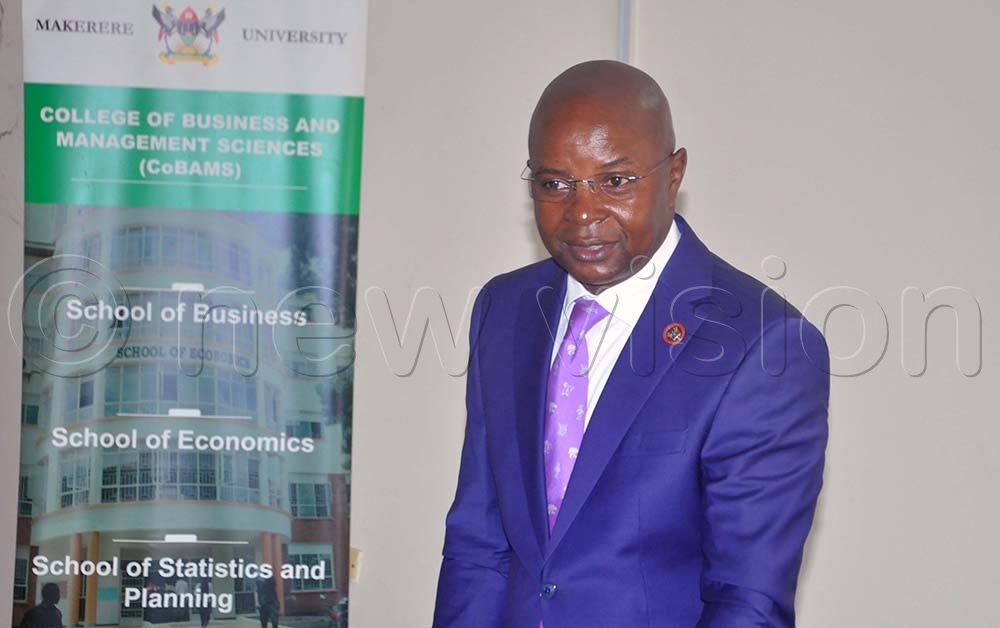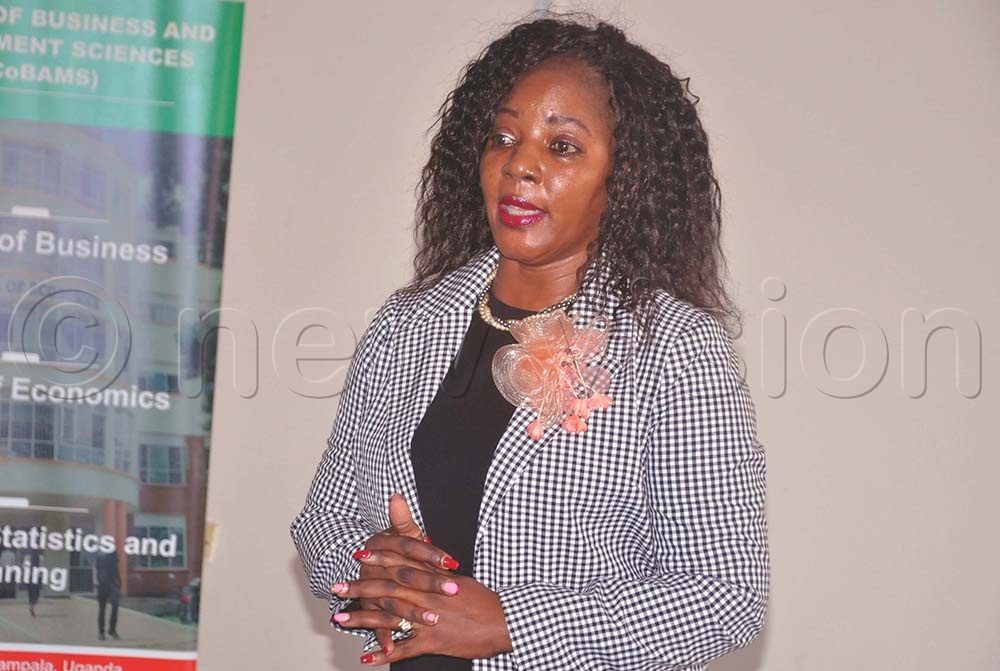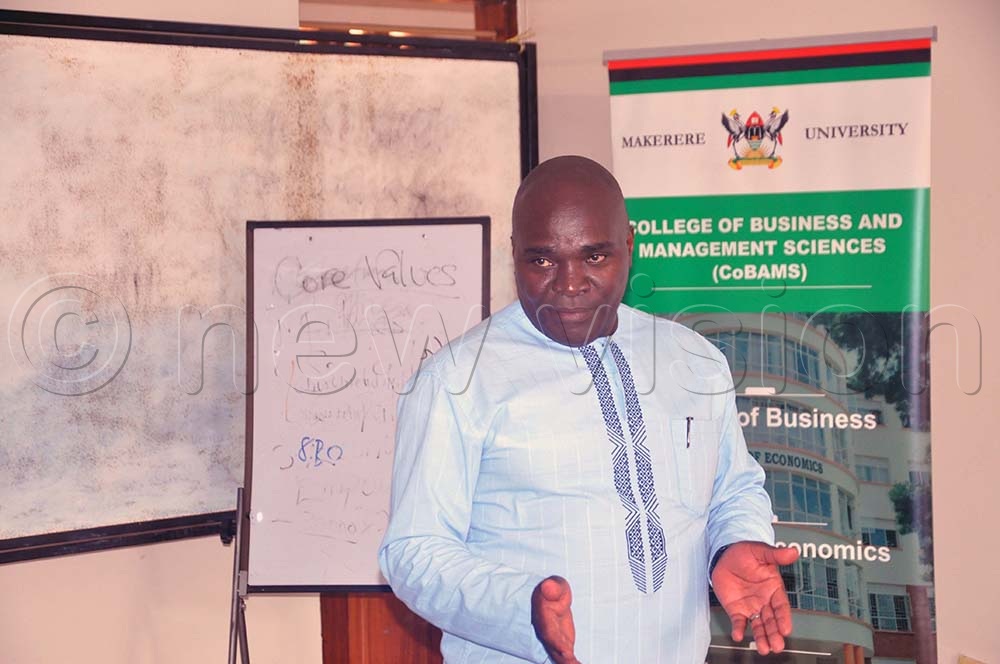Forests, wetlands value trumps short-term projects, says Makerere don
MakRIF Grant Management Committee vice chairperson Dr Sabrina Kitaka warned that human encroachment on nature fuels disease outbreaks, disasters and environmental disruption.
Local government officials and facilitators during the training for district local government officials conducted under the theme: ‘Environmental Valuation, Evaluation, Accounting and Climate Change Mitigation and Adaptation in Uganda’. It is being held at the Central Inn Hotel in Entebbe. (Credit: John Odyek)
WAKISO - Forests, wetlands, rivers, lakes and biodiversity provide vital ecosystem services that are often undervalued, overlooked, or sacrificed to make way for short-term economic, political, or social projects, a Makerere University scholar has said.
Environment for Development Makerere Center (EfD-Mak) director Prof. Edward Bbaale, who is the principal of the College of Business and Management Sciences at Makerere University, says when properly valued, natural resources far outweigh the short-lived benefits of destructive projects.
He cites the example of clearing a forest for sugarcane plantations, which may create jobs but destroys the forest’s role in carbon sequestration, rainfall formation, soil conservation, biodiversity protection and tourism.
“When properly valued in monetary terms, the contribution of that forest can outweigh the short-term gains of sugarcane cultivation,” Bbaale says.
Bbaale addressing participants attending the training for District Local Government officials run under the theme: ‘Environmental Valuation, Evaluation, Accounting and Climate Change Mitigation and Adaptation in Uganda’. It is being held at the Central Inn Hotel in Entebbe. (Credit: John Odyek)
He was speaking on Thursday, September 18, 2025, at the opening of a two-day training for district local government officials under the theme: Environmental Valuation, Evaluation, Accounting and Climate Change Mitigation and Adaptation in Uganda at Central Inn, Entebbe in Wakiso district.
The training brought together officials from Kampala Capital City Authority, Entebbe, Wakiso, Mpigi and Mukono districts. It is organised by EfD-Mak Centre with funding from the Makerere University Research and Innovation Fund (MakRIF).
Climate change
Bbaale said the training comes at a critical time when climate change is affecting agriculture, health, water resources and economic development in Uganda.
“Uganda must embrace environmental valuation and natural capital accounting as integral to national planning,” he said.
“Traditional measures such as GDP fail to capture ecosystem depletion, but integrating environmental variables can guide sustainable growth and intergenerational equity.”
He urged environmental officers to build strong professional networks and use economic evidence to defend natural resources against competing land uses.

Kitaka speaking to participants attending the training for District Local Government officials under the theme: ‘Environmental Valuation, Evaluation, Accounting and Climate Change Mitigation and Adaptation in Uganda’. It is being held at the Central Inn Hotel in Entebbe. (Credit: John Odyek)
“This training is more than a technical exercise; it is a strategic investment in Uganda’s sustainable future. By equipping you with valuation skills, we are enabling you to speak the language of economists and policymakers, and to ensure that the environment is treated as a vital asset, not a free good,” Bbaale added.
MakRIF Grant Management Committee vice chairperson Dr Sabrina Kitaka warned that human encroachment on nature fuels disease outbreaks, disasters and environmental disruption.
“Environmental health is human health. When we destroy habitats, we invite diseases into human populations. Flash floods, rising temperatures, and new disease vectors are all linked to poor environmental management,” she said, adding that local expertise, not just foreign consultants, must drive solutions.
Dr John Sseruyange, a lecturer at Makerere’s School of Economics, noted that weak public awareness and underfunding of environmental protection agencies compound the risks. Sseruyange stressed that projects must demonstrate climate-proofing and gender equity to avoid severe consequences such as biodiversity loss, pollution and disease outbreaks.

Sseruyange facilitating the training for District Local Government officials under the theme: ‘Environmental Valuation, Evaluation, Accounting and Climate Change Mitigation and Adaptation in Uganda’. It is being held at the Central Inn Hotel in Entebbe. (Credit: John Odyek)
Dr Aisha Nanyiti, a lecturer in the department of policy and development economics Makerere University, emphasised the need for local governments to design context-appropriate policies on climate mitigation and adaptation.
Nanyiti explained that climate change results from both natural processes and human activities such as deforestation, fossil fuel burning, and unplanned urbanisation.
District officials shared real-life experiences. Veronica Nalunga, a wetlands officer from Wakiso, said rising night temperatures are forcing residents to sleep uncovered, while forest encroachment and population growth worsen food insecurity.
Richard Okello, a health inspector in Makindye Division, said people in Packwach district sometimes sleep outdoors to escape the heat, exposing themselves to malaria, snake bites, and theft.
The training aims to build a cadre of local government champions who can integrate environmental valuation into decision-making and protect Uganda’s natural assets from unsustainable exploitation.